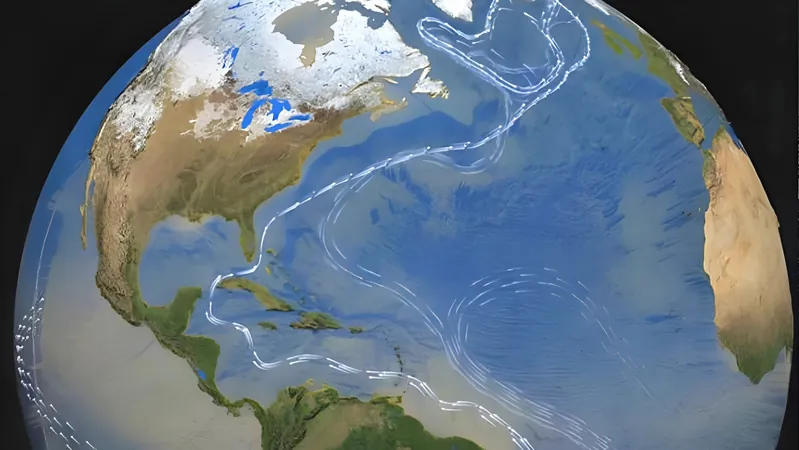
Shockingly Good News: Atlantic Ocean Current System Will Weaken, But Not Collapse!
2025-06-04
Author: Ming
The Atlantic Conveyor Belt Under Threat?
The Atlantic Meridional Overturning Circulation, or AMOC, is a massive oceanic system that transports warm water from the tropics to northern latitudes, returning cold, dense water back south at deeper levels. For years, scientists have feared that increasing greenhouse gas emissions could cripple this vital "conveyor belt" of the Atlantic.
Study Offers Hope Amid Warnings
A groundbreaking new study from the California Institute of Technology (Caltech) reveals that while the AMOC is set to weaken, it will likely avoid the catastrophic near-collapse predicted by some models. This study combines advanced modeling with two decades of real-world data, offering a more balanced view of the current situation.
Revising Predictions with Real Data
Lead author Dave Bonan, who conducted this research during his doctoral studies, highlights significant discrepancies in climate models regarding the AMOC. Instead of trying to harmonize these complex simulations, his team focused on a crucial relationship: the connection between the current’s strength, depth, and its sensitivity to warming and freshwater influx.
Their findings suggest a slowdown of approximately 18 to 43 percent by 2100, a noteworthy reduction but far less drastic than previously feared 60-80 percent declines.
Understanding AMOC Depth and its Implications
The researchers uncovered that biases in current models largely stem from the depth at which the AMOC operates. A deeper current enables climatic changes to affect it more significantly, thus intensifying a slowdown.
What Does This Mean for the Future?
Even with a weakening of up to 40 percent, consequences loom on the horizon: northern Europe could cool, sea levels along the U.S. East Coast may rise, and tropical precipitation patterns could shift. Thankfully, the new forecast indicates that these effects will occur more gradually than initially feared, giving societies precious time to adapt.
A Call for Better Climate Models
This study also emphasizes the importance of refining climate models to capture the ocean’s structural complexity more accurately. Co-author Andrew Thompson believes this work lays the groundwork for testing next-generation models that can better account for influences like wind, mixing, and ice melt on the AMOC.
The Urgent Need for Emission Cuts Still Stands
Despite a more optimistic outlook, the authors warn that a slowdown of 20-40 percent still poses risks, including heightened coastal flooding and potential disruptions to weather patterns for billions.
Other climate systems remain sensitive to warming, underscoring that the fight against rising emissions is far from over. Bonan concludes, "There is immense value in doing basic research—it can give us a better indication of what the future might look like, as our study shows."
Key Takeaways
To sum up, while the Atlantic Ocean current system may be more resilient than some dire forecasts suggested, it is still not immune to the escalating pressures of climate change. This latest research provides clarity on the future of the AMOC, highlighting the critical stakes of curbing global warming while time is still on our side.
Stay informed—this is a story worth following!


 Brasil (PT)
Brasil (PT)
 Canada (EN)
Canada (EN)
 Chile (ES)
Chile (ES)
 Česko (CS)
Česko (CS)
 대한민국 (KO)
대한민국 (KO)
 España (ES)
España (ES)
 France (FR)
France (FR)
 Hong Kong (EN)
Hong Kong (EN)
 Italia (IT)
Italia (IT)
 日本 (JA)
日本 (JA)
 Magyarország (HU)
Magyarország (HU)
 Norge (NO)
Norge (NO)
 Polska (PL)
Polska (PL)
 Schweiz (DE)
Schweiz (DE)
 Singapore (EN)
Singapore (EN)
 Sverige (SV)
Sverige (SV)
 Suomi (FI)
Suomi (FI)
 Türkiye (TR)
Türkiye (TR)
 الإمارات العربية المتحدة (AR)
الإمارات العربية المتحدة (AR)